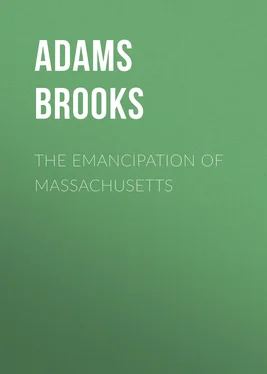To attempt even an abstract of the thought of the English Reformation would lead too far, however fascinating the subject might be. It must suffice to say briefly that theology had little or nothing to do with it. Wycliffe denounced the friars as lazy, profligate impostors, who wrung money from the poor which they afterwards squandered in ways offensive to God, and he would have stultified himself had he admitted, in the same breath, that these reprobates, when united, formed a divinely illuminated corporation, each member of which could and did work innumerable miracles through the interposition of Christ. Ordinary miracles, indeed, could be tested by the senses, but the essence of transubstantiation was that it eluded the senses. Thus nothing could be more convenient to the government than to make this invisible and intangible necromancy a test in capital cases for heresy-Hence Wycliffe had no alternative but to deny transubstantiation, for nothing could be more insulting to the intelligence than to adore a morsel of bread which a priest held in his hand. The pretension of the priests to make the flesh of Christ was, according to Wycliffe, an impudent fraud, and their pretension to possess this power was only an excuse by which they enforced their claim to collect fees, and what amounted to extortionate taxes, from the people. [Footnote: Nowhere, perhaps, does Wycliffe express himself more strongly on this subject than in a little tract called The Wicket , written in English, which he issued for popular consumption about this time.] But, in the main, no dogma, however incomprehensible, ever troubled Protestants, as a class. They easily accepted the Trinity, the double procession, or the Holy Ghost itself, though no one had the slightest notion what the Holy Ghost might be. Wycliffe roundly declared in the first paragraph of his confession [Footnote: Fasciculi Zizaniorum, 115.] that the body of Christ which was crucified was truly and really in the consecrated host, and Huss, who inherited the Wycliffian tradition, answered before the Council of Constance, “Verily, I do think that the body of Christ is really and totally in the sacrament of the altar, which was born of the Virgin Mary, suffered, died, and rose again, and sitteth on the right hand of God the Father Almighty.” [Footnote: Foxe, Acts and Monuments
Конец ознакомительного фрагмента.
Текст предоставлен ООО «ЛитРес».
Прочитайте эту книгу целиком, купив полную легальную версию на ЛитРес.
Безопасно оплатить книгу можно банковской картой Visa, MasterCard, Maestro, со счета мобильного телефона, с платежного терминала, в салоне МТС или Связной, через PayPal, WebMoney, Яндекс.Деньги, QIWI Кошелек, бонусными картами или другим удобным Вам способом.












